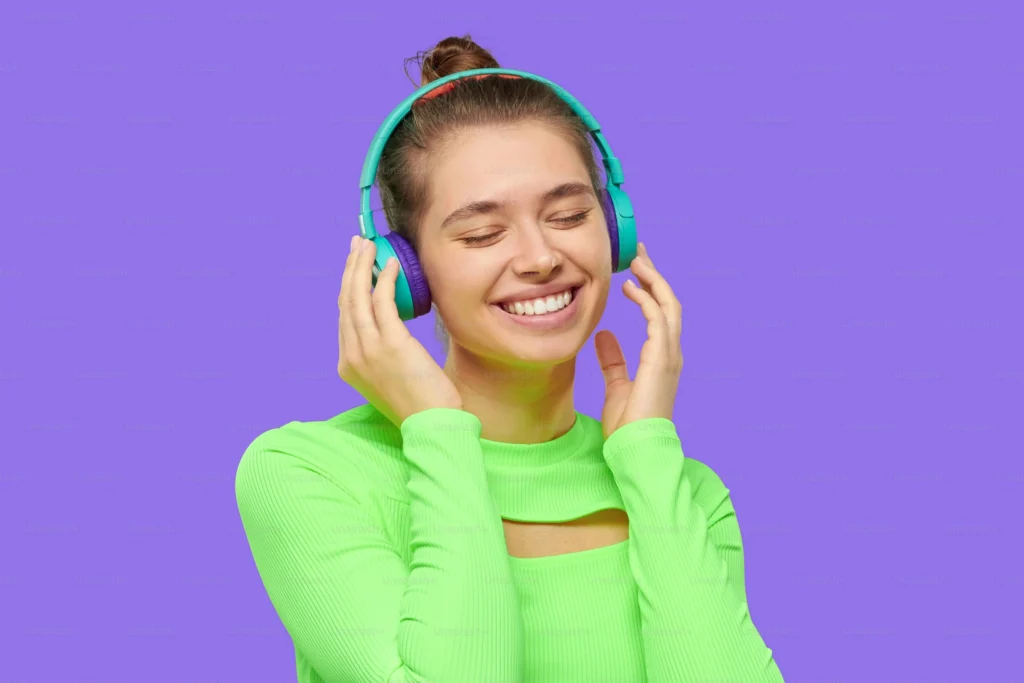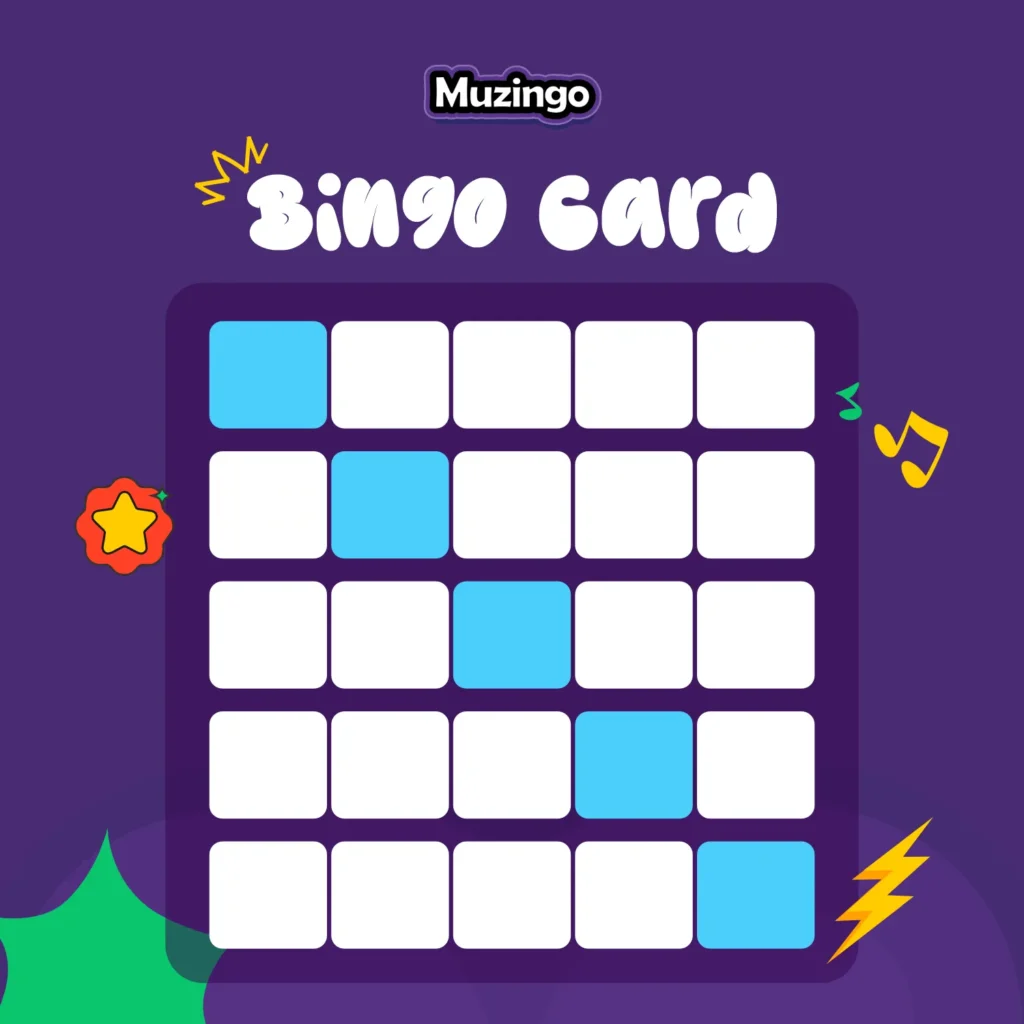Music has the remarkable ability to transport us through time. Old songs—those classic tracks that defined our teenage years or marked life milestones—have a unique way of making us feel happy, nostalgic, and connected. Neuroscience confirms that listening to familiar music triggers pleasure centers in the brain while recalling memories, enhancing both mood and cognitive engagement.
Beyond personal enjoyment, old songs foster social connection. Platforms like Muzingo take this experience further by transforming music into interactive bingo-style games. Friends and family can play together, sharing laughter, nostalgia, and competition—all while engaging with their favorite tunes.
This article explores the science behind why old songs make us happy, the cognitive and social benefits of nostalgia in music, and practical ways to enjoy music games like Muzingo.

Related Blog Posts
- WHY THE BEST MUSIC BINGO HOSTS NEVER PLAY FULL SONGS (AND NEITHER SHOULD YOU)
- TOP 20 THROWBACK SONGS THAT ALWAYS WIN AT MUSIC BINGO
- THE TOP 10 MUST-HAVE UPBEAT COUNTRY SONGS FOR A MUSIC BINGO
- THE ULTIMATE GUIDE TO MUSIC BINGO PLAYLISTS: THEMES AND SONGS
Why Old Songs Trigger Happiness
The joy we feel when listening to old songs is deeply rooted in neuroscience. Familiar music activates the brain’s reward centers, releasing dopamine, the neurotransmitter associated with pleasure and motivation. When a song from our past plays, our brains often recall not only the tune but also associated memories, emotions, and even smells or sights, creating a full sensory experience.
This phenomenon, known as music-evoked autobiographical memory, helps explain why certain tracks instantly make us feel nostalgic or elated. For example, a song you heard during high school might bring back images of friends, first dates, or favorite moments, sparking joy even decades later.
Psychologists have also found that old songs can reduce stress and anxiety. Familiar melodies provide a sense of comfort and predictability, which soothes the nervous system. The combination of nostalgia and rhythm creates a unique emotional cocktail, capable of improving mood almost instantly.
The Role of Music Games in Enhancing Joy
Interactive platforms like Muzingo leverage the emotional power of old songs by turning listening into gameplay. By matching music clips to bingo cards, players engage multiple senses—hearing, sight, and motor skills—which amplifies the brain’s pleasure response. Every successful round, every “Muzingo” win, triggers positive reinforcement, further boosting happiness.
Unlike passive listening, music games create shared experiences. Friends and family can play together across distances, connecting over familiar tracks, celebrating victories, and laughing at missed guesses. This combination of old songs, competition, and collaboration strengthens social bonds while enhancing individual joy.
Quick tips for using old songs in music games:
- Create themed playlists featuring tracks from different decades or life stages.
- Rotate playlists to surprise players and trigger unexpected nostalgia.
- Encourage participants to share personal stories related to the songs.
How Memory and Emotion Intersect
Studies show that memory and emotion are intertwined. Old songs act as triggers for autobiographical memories, which are often emotionally charged. The stronger the emotional connection to the original experience, the more intense the reaction to the music. This is why hearing a song from childhood or teenage years can instantly lift spirits.
The hippocampus, a brain region crucial for memory formation, works with the amygdala, which processes emotion, to create this effect. Music essentially acts as a bridge between past experiences and present feelings, explaining why old songs can induce happiness even in stressful or mundane moments.

Old Songs and Social Connection
Music has always been a social glue. Sharing favorite tracks, singing along, or playing music-based games fosters interaction. With platforms like Muzingo, players can take this further: old songs become interactive tools for social bonding. Each player contributes to the shared experience, and the collective memory of the songs generates laughter, excitement, and camaraderie.
Social psychologists emphasize that shared musical experiences strengthen friendship and family ties. Participating in music bingo or other games built around old songs transforms passive listening into active engagement, which deepens connection and collective joy.
Why Nostalgia in Music Matters
Nostalgia is more than sentimentality—it is a powerful emotional experience. Listening to old songs can evoke memories of significant events, childhood experiences, or teenage milestones. Neuroscientists show that this emotional recall activates the hippocampus and amygdala, combining memory retrieval with emotional intensity.
These experiences contribute to:
- Enhanced happiness: Recalling joyful memories elevates mood.
- Stress reduction: Familiar music can lower cortisol levels.
- Stronger social bonds: Shared memories spark conversation and connection.
How Old Songs Activate Happiness in the Brain

The Role of Dopamine and the Reward System
Hearing a favorite old song triggers the ventral striatum, releasing dopamine—the neurotransmitter associated with pleasure. This reward mechanism explains why people often feel inexplicably uplifted when listening to music from their past.
Emotional Memory Recall and the Hippocampus
The hippocampus retrieves autobiographical memories linked to old songs, which explains why certain tracks instantly bring back vivid recollections of places, people, and moments. Pairing these memories with interactive music games like Muzingo strengthens the emotional impact, as players experience joy collectively.
The Social Benefits of Listening to Old Songs
Shared Memories and Friendship Bonds
Music is inherently social. Sharing old songs with friends, family, or colleagues can reignite memories and create new shared experiences. It can also reinforce long-distance friendships by providing a common emotional touchpoint.
Online Music Games as Social Catalysts
Interactive platforms like Muzingo turn music listening into shared gameplay. Friends can compete to match songs to bingo cards, hit the “Muzingo” button when they win, and celebrate together, amplifying joy while connecting over nostalgia.
Take Your Game Nights to the Next Level
Muzingo is a fun game where players listen to music tracks and match them to bingo cards — competing to win prizes with friends.
Play Muzingo FreeNo Card Required
Optimized Image Suggestion (Pexels): Friends video chatting while playing music bingo
Muzingo: Making Old Songs Interactive and Fun
How Music Bingo Works
Muzingo converts classic tracks into engaging bingo-style games. Players receive cards with song titles, listen to short clips, and race to match songs. Hitting five tiles in any direction and clicking “Muzingo” delivers instant satisfaction and shared excitement.
Tips for Hosting Nostalgic Music Bingo Nights
- Rotate playlists to include everyone’s favorite old songs
- Use themed playlists: 90s pop, Disney classics, or 80s rock
- Encourage storytelling or anecdotes tied to each song
- Mix in mini challenges like “Finish the Lyrics” rounds
Creating Playlists of Old Songs That Spark Joy
Decade-Based Playlists
Focus on a particular era to evoke specific memories:
- 70s disco classics
- 80s synth-pop hits
- 90s pop anthems
Mood and Theme Playlists
- Joyful and energetic songs for game nights
- Relaxing tracks for nostalgia and reflection
- Party hits for shared celebration
Platforms like Muzingo allow users to turn these playlists into playable bingo games, combining the cognitive joy of music with interactive social engagement.
The Cognitive and Emotional Benefits of Old Songs
Memory Enhancement
Listening to old songs strengthens neural pathways associated with memory, particularly autobiographical recall. Music bingo games reinforce this by requiring players to actively remember and match songs to their cards.
Stress Reduction and Mood Improvement
Familiar tracks can reduce anxiety and elevate mood through dopamine release. Incorporating old songs into social gameplay enhances this effect by pairing emotional satisfaction with laughter and collaboration.
Examples of Old Songs That Make Us Happy
- 90s Pop Hits: Britney Spears, Backstreet Boys, NSYNC
- Classic Rock: Queen, Fleetwood Mac, The Rolling Stones
- Soul and Motown: Marvin Gaye, Stevie Wonder, Aretha Franklin
- Disney Classics: “Hakuna Matata,” “A Whole New World”
- Early 2000s Hits: Green Day, Eminem, OutKast
Curating playlists from these songs ensures maximum engagement and enjoyment during music bingo sessions.
Hosting Successful Old Song Muzingo Nights
- Select recognizable songs for all participants
- Organize themed nights by decade, genre, or personal milestones
- Encourage shared memories and storytelling
- Rotate hosts and playlists for fresh experiences
- Introduce mini-challenges to increase excitement
These strategies ensure each Muzingo night is interactive, memorable, and emotionally rewarding.
Tips for Hosting Large-Scale Old Song Muzingo Events
- Use breakout rooms for smaller competitions
- Display leaderboards for friendly rivalry
- Rotate themes weekly for variety
- Encourage chat for shared reflections and memories
FAQ
How do old songs trigger happiness in the brain?
Familiar music activates the reward system, releases dopamine, and retrieves emotional memories, producing joy.
Can playing music games with old songs improve mood long-term?
Yes. Regular engagement strengthens emotional well-being and social bonds.
Is Muzingo suitable for non-musicians?
Absolutely. The game requires only listening and matching clips to bingo cards.
How can old songs enhance social connections?
Shared musical experiences foster laughter, collaboration, and conversation, deepening relationships.
How often should friends play music bingo with old songs?
Weekly or bi-weekly sessions maintain excitement, social connection, and anticipation.
Strengthening Friendship and Connection Through Old Songs
Old songs are powerful tools for social bonding. By combining nostalgia with interactive games like Muzingo, friends and families can relive cherished memories while creating new ones. Scheduled music bingo nights, themed playlists, and shared anecdotes strengthen emotional connections, even across long distances.
Creating consistent rituals around old songs transforms simple listening into meaningful shared experiences, fostering long-term friendship and happiness.

Conclusion
Listening to old songs provides more than nostalgia—it promotes joy, reduces stress, and strengthens social connections. Platforms like Muzingo elevate this experience by turning passive listening into an interactive, collaborative activity. By combining the cognitive pleasure of familiar tunes with engaging gameplay, friends and family create shared laughter, memorable moments, and emotional connection.
Integrating old songs into regular music bingo sessions fosters happiness, nurtures relationships, and cultivates lasting memories. Whether curating decade-based playlists, hosting themed game nights, or challenging friends to a musical showdown, the combination of nostalgia and gameplay amplifies the joy of music.
Which old song will you play first at your next Muzingo session? Invite your friends, curate a nostalgic playlist, and experience the happiness of shared music like never before. Start playing and creating memories with Muzingo today.


